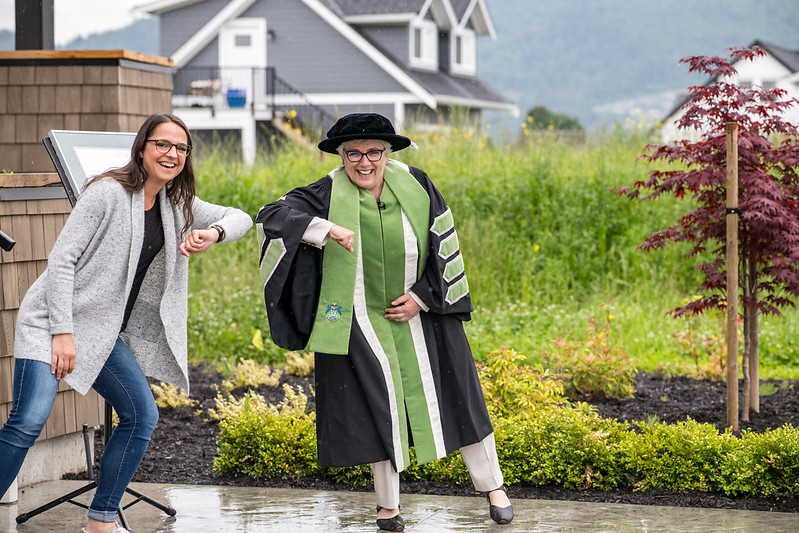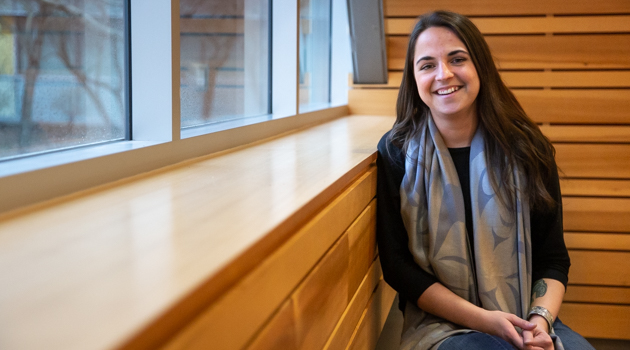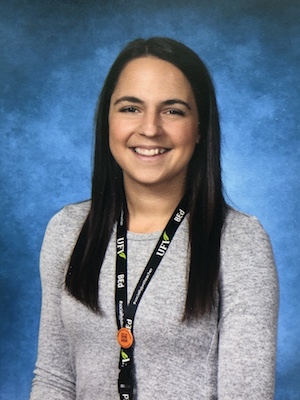Lieutenant governor’s medal — Tsandlia Van Ry: UFV learning journey helped Stó:lō woman reconnect with roots

Not too many people can say that they’ve named a school before they even finished their teacher training.
Tsandlia Van Ry can.
She and a small group of community members proposed the name Stitó:s Lá:lém Totí:lt (‘place of crossing, house of learning’ in Halq’eméylem) for the new elementary/middle school under construction in Chilliwack. This name reflects the historical significance of the territory where the school is being built.
Van Ry has already been hired as a teacher on call by the Chilliwack School District and is eager to start work in September.
But first, she’s enjoying the recognition of her work, with the recent announcement that she is the 2020 recipient of the Lieutenant Governor’s medal at the University of the Fraser Valley. The criteria for the medal includes student involvement in promoting diversity, inclusion, and reconciliation.
Van Ry is receiving her second credential, a Bachelor of Education, from UFV this spring, after having completed a Bachelor of Kinesiology in 2018. But her connection to UFV goes back longer than that. When UFV had a childcare centre in the mid-1990s, she attended as a baby and toddler. One could say UFV has been a part of her life from the very beginning.
Soon after her daycare stint, however, she moved with her mother to Kamloops, and completed high school disconnected from her Stó:lō culture. Although she visited family in Ts’elxwéyeqw (Chilliwack) over the years, it wasn’t the same as living there.
As a young woman she returned to S’ólh Téméxw (Our Land), the traditional home of the Stó:lō people, to pursue studies at UFV. And her reconnection with her culture began, fueled mostly by community connection but also by her learning journey at UFV.
“It’s amazing how much being part of the land and making those connections can teach you,” she observes. “I have learned so much from the land, and knowledge keepers around me. It was difficult not being immersed in my culture growing up, although I didn’t know it at the time. Returning here really sparked my re-learning and re-integration to my community. My true identity had always been there, beneath the surface, and once I returned home, I couldn’t ignore it.”

Her first goal was to get a kinesiology degree and gain admission to medical school. But two experiences influenced her to change her mind and pursue a teaching career instead.
One was working as research assistant in 2017/18 for Dr. Keith Carlson on a project that explored Swoxwiyám across different Stó:lō communities.
“Swoxwiyám are the oral histories that speak to how our world has become what we see today, and embedded in them, are teachings,” she explains. “Swoxwiyám teach Stó:lō people how to live in a good way.”
She and other researchers did a thorough literature review of published works by professional and amateur anthropologists who had recorded the histories after meeting with Indigenous Coast Salish people at different times since first European contact. They transcribed the histories from various sources, digitized them, and gathered them in a spreadsheet.
The experience ignited her interest in learning more about her own cultural and history, and made her think about becoming more engaged with her community in the educational realm. Learning more about her history helped to solidify that her future was in the classroom, teaching and learning with others.
“This experience gave me the perfect opportunity to explore who I am as a Stó:lō woman and educator.”
Then she travelled to Antigua/Barbuda, West Indies with the School of Kinesiology’s Champions for Health program, which gives UFV students the experience of promoting life skills education to elementary-age students through school-based physical and health education. Run by Dr. Joanna Sheppard, a kinesiology professor, the program has inspired many students to pursue a teaching career, Van Ry included.
“Antigua was truly a transformational experience for me. It opened my eyes to how powerful and influential educators can be in the lives of children. My heart felt at home in the classroom. I remember driving home from a visit to Kamloops and calling Joanna Sheppard on speakerphone and telling her that I thought I needed to become a teacher. She said she knew from the beginning I had education in my heart, but that she needed to let me discover that on my own. Her mentorship in education allowed me to discover my passion for teaching.”
She found her next home at UFV in the Bachelor of Education, a one-year teacher training program.
 “All through my time at UFV I found my professors to be genuinely supportive of every student’s journey. The programs are so inclusive. We were encouraged to pursue our passions and incorporate our world views. The faculty sincerely want to get to know you. We have an education family here. You know that the person teaching you wants to see you succeed and explore your own identity.”
“All through my time at UFV I found my professors to be genuinely supportive of every student’s journey. The programs are so inclusive. We were encouraged to pursue our passions and incorporate our world views. The faculty sincerely want to get to know you. We have an education family here. You know that the person teaching you wants to see you succeed and explore your own identity.”
She really enjoyed teaching Grade 4 in her practicum at Vedder Elementary.
“Children are so open to being inclusive, and they go out of their way to be kind.”
She plans to integrate her Indigenous perspective and a social justice lens into all parts of the curriculum once she’s teaching in the classroom.
“Teaching is all about perspective. We can present learning opportunities that create conversations regarding social justice issues that can be applied to sciences, socials, and language arts. Moving forward in the world it’s not enough to be aware of your own beliefs. You have to try to see the world through others’ eyes. That’s what’s really powerful.”
In the nomination letter for the Lieutenant Governor’s medal award, Teacher Education program head Vandy Britton noted that Van Ry shared her Indigenous knowledge with a generous spirit.
“Tsandlia brought a wealth of knowledge and experience with her — including extensive cultural knowledge — into the program, and she willingly shared her understandings with her peers. For Tsandlia, reconciliation is understood as both a personal responsibility to learn and to understand for herself, but also as a professional responsibility.”
 Van Ry has another important mentor at UFV. Her aunt is Dr. Wenona Hall, an associate professor of Indigenous Studies, who encouraged her to take on the research project with Keith Carlson. And Hall is encouraging Van Ry to continue her education at the graduate level.
Van Ry has another important mentor at UFV. Her aunt is Dr. Wenona Hall, an associate professor of Indigenous Studies, who encouraged her to take on the research project with Keith Carlson. And Hall is encouraging Van Ry to continue her education at the graduate level.
“I don’t think I’m done with my education. After some time teaching elementary school, I’d like to go on and earn my master’s and PhD and teach at the university level. Maybe I’ll come back and teach here and be a true UFV lifer!”
And the family mentors reach back into her grandparents’ generation.
“My grandfather Robert Francis Hall Sr, son of Gordon Hall of Skowkale, was an advocate for the recognition and acknowledgement of the rights of Indigenous peoples. He spent much of his early life as a part of Red Power as well as providing leadership within our communities in Chilliwack. He had activism in his heart, and I believe that much of my strength comes from him and his children (my mother, aunts, and uncles). I find confidence, strength, and guidance in his lived experiences and his teachings. Through every conversation with him, he always meant business. He saw every moment as important, and would move heaven and earth for his grandchildren. He told us that we were only as strong as the relationships that we built.”




